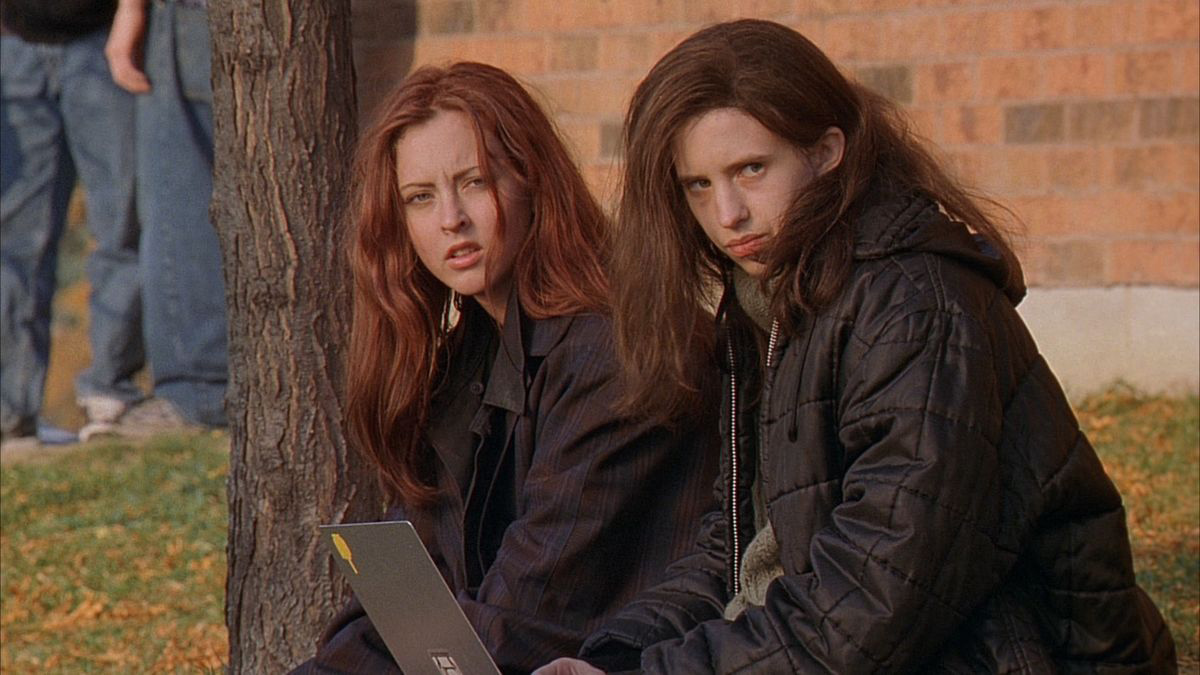Ginger Snaps is a 2000 Canadian cult horror movie about a teenage girl, Ginger, who is turned into a werewolf, and her younger sister, Brigitte. It has lots of gore, more feminist underpinnings than a Margaret Atwood novel, and feels like something your mom would have regretted letting you rent from the video store. In a way that’s still compelling 20 years after its release, Ginger Snaps uses lycanthropy as a metaphor for growing up to talk about how girls on the cusp of adolescence can feel constrained — or even doomed — by society’s expectations of them as young women.
Ginger and Brigitte are obsessed with death and plan to committ suicide before they are both 16. However, before they can get around to it, Ginger gets her first period. Attracted by the smell of the blood, the werewolf that has been killing dogs in their suburb attacks her. Ginger escapes, but she quickly notices her body changing: she starts growing coarse hair, a tail, dewclaws, and sharp teeth; she is overcome with lust, both regular and for blood — and she has cramps.
The metaphor of lycanthropy as female puberty is evident — Ginger’s period is even referred to as “the curse.” But Ginger Snaps isn’t a feel-good coming-of-age movie; Ginger doesn’t learn to control the wolf, and Brigitte is ultimately unable to save her. It would have been far more obvious for a movie so couched in feminism to end with Ginger getting over the angst of puberty and the associated slutshaming, social exclusion, and sexual pressure the movie critiques, and find motivation to live like Brigitte does. So, why does Ginger Snaps have a tragic ending?
On the surface, Ginger Snaps is similar to later feminist horror movie, Jennifer’s Body, in which the titular Jennifer is sacrificed to the devil by an indie-rock band and ressurects as a demon who gets strength from seducing and eating boys. Jennifer’s best friend, Needy, decides to kill Jennifer to prevent the deaths of more innocent boys, but it’s clear that Jennifer was, on some level, a victim as well.
Ginger is literally a victim — of a werewolf attack rather than a sexual assault-coded ritual slaughter by Fall Out Boy rejects. But metaphorically, what happens to her happens to everyone; it’s just growing up, yet it destroys her. And rather than being killed by Brigitte like Jennifer is by Needy, Ginger kills herself by running into Brigitte’s knife.
Suicide is established as an important theme in the first scene with Ginger and Brigitte, where Ginger pressures Brigitte into shaking on their suicide pact. Brigitte points out that they made it when they were eight, already reluctant to be “out by 16 or dead on the scene, but together forever.” Ginger, however, is still committed to dying young.
Ginger doesn’t want to grow up; she violently rejects it and is unable to cope with puberty when it arrives. There’s a scene where Ginger brushes off Brigitte’s concern as jealousy, saying “I’m growing up and you’re not,” but the opposite is true. Ginger loses control, unable to resist doing things that are established earlier in the film as things she doesn’t want to do — for example, having sex with boys, doing drugs, and dressing in a sexualized way. But Brigitte takes control: she starts looking for ways to help and apprehend her sister, and she makes a friend outside of her and Ginger’s unhealthy relationship. Brigitte’s eventual sense of self is why Brigitte lives, and Ginger dies.
While hiding a body with Brigitte, Ginger insists that they’ll never be suspected of murder because they’re girls, saying: “A girl can only be a slut, a bitch, a tease, or the virgin next door. We’ll just coast on how the world works.” Ginger wants to commit suicide because she doesn’t want to be forced into one of these misogynist boxes, which to her, is synonymous with growing up; Brigitte, on the other hand, explicitly chooses to live so she can be herself.
Ginger Snaps is about the weird, scary, and uncomfortable parts of being a young woman losing your childhood identity and relationships. And the movie’s themes map well onto other periods of transition like moving out or leaving high school; Ginger might be going through puberty, but the larger lessons about societal expectations and womanhood are universal.


